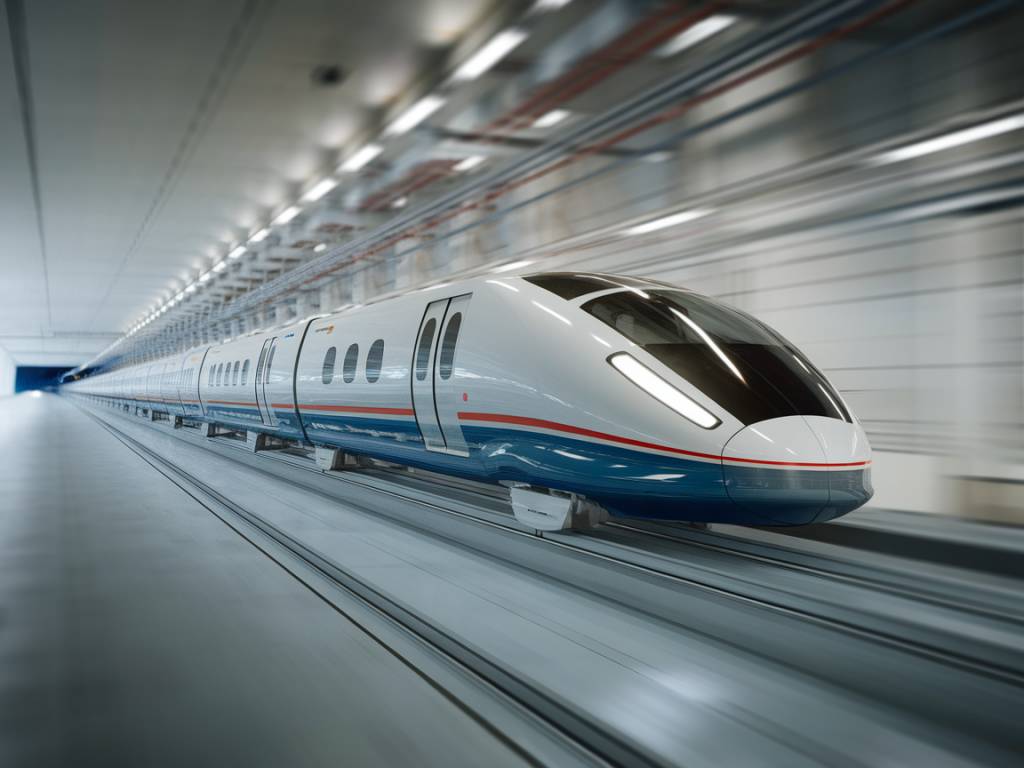The transportation industry is on the cusp of a revolution, and one of the most promising innovations is Hyperloop technology. Considered by many as the future of long-distance freight transport, Hyperloop aims to drastically reduce transportation time, lower costs, and improve logistics efficiency. In this article, we will delve into how Hyperloop technology is set to disrupt the future of freight transportation.
What is Hyperloop?
Hyperloop is a proposed mode of passenger and freight transportation that would propel pods through a low-pressure tube at speeds exceeding 700 mph. The concept was popularized by Elon Musk, CEO of SpaceX and Tesla, through a white paper published in 2013. Unlike traditional transportation methods, Hyperloop minimizes friction and air resistance, enabling ultra-fast travel. This technology leverages magnetic levitation (maglev) and electric propulsion systems to achieve its high speeds.
The Need for Hyperloop in Freight Transport
Global supply chains are becoming increasingly complex, and the need for efficient, reliable, and rapid transport solutions has never been greater. Traditional freight transport methods—such as trucks, trains, and ships—come with various challenges, including long transit times, high operational costs, and environmental concerns. Here’s why Hyperloop could be the game-changer the logistics industry is waiting for:
- Speed: Hyperloop can drastically cut down on travel time. Freight that would typically take days to transport by truck or ship could be delivered in a matter of hours.
- Cost-Efficiency: While the initial investment may be high, operational and maintenance costs could be significantly lower in the long run.
- Environmental Impact: Traditional transport methods contribute significantly to carbon emissions. Hyperloop, being electrically powered and more energy-efficient, could help reduce the carbon footprint of freight transportation.
- Reliability: Hyperloop operates in a controlled environment, making it less susceptible to weather conditions and other external factors that commonly affect traditional transport modes.
How Hyperloop Works: The Technology Behind It
Understanding the technology that powers Hyperloop is crucial for appreciating its potential impact on freight transportation.
- Low-Pressure Tubes: Hyperloop systems rely on low-pressure tubes to minimize air resistance. These tubes are either above ground or underground and create an almost vacuum-like environment.
- Magnetic Levitation: Hyperloop pods use magnetic levitation (maglev) to float above the tracks, eliminating friction between the pod and the track.
- Electric Propulsion: Linear electric motors propel the pods forward, allowing them to achieve high speeds with minimal energy consumption.
- Levitation and Stabilization: Advanced sensors and control systems ensure that pods remain stable and correctly oriented throughout their journey.
Potential Applications for Freight Transport
Hyperloop’s high-speed capabilities open up a range of new possibilities for freight transport. Here are some of the key applications:
- Just-In-Time (JIT) Deliveries: Hyperloop can support JIT manufacturing processes by providing rapid, reliable transport for critical supply chain components.
- Perishable Goods: Fast transport can significantly extend the shelf life of perishable goods, making it easier to distribute fresh produce and other perishables.
- High-Value Cargo: Hyperloop’s secure and controlled environment is ideal for transporting high-value goods, such as electronics and pharmaceuticals.
Hyperloop Projects Around the World
Several companies and countries are investing in Hyperloop technology, each aiming to be at the forefront of this transportation revolution.
- Virgin Hyperloop: Headquartered in Los Angeles, Virgin Hyperloop has successfully conducted passenger tests and is now focusing on freight applications. They are working on routes in the United States, India, and the Middle East.
- Hyperloop Transportation Technologies (HTT): Based in California, HTT collaborates with governments worldwide to develop Hyperloop systems. They are involved in projects in Europe, the United Arab Emirates, and South America.
- Elon Musk’s Boring Company: While primarily focused on tunneling technology, Elon Musk’s Boring Company is also exploring the potential of Hyperloop for cargo transportation.
- TransPod: A Canadian company, TransPod is actively working on Hyperloop projects in Canada, Europe, and Southeast Asia to bring their vision of rapid cargo transportation to life.
Challenges and Concerns
Despite its promise, Hyperloop technology faces several challenges that need to be addressed before it can become a mainstream mode of freight transport:
- Infrastructure Costs: Building the extensive infrastructure needed for Hyperloop systems involves significant investment. This could be a barrier to widespread adoption.
- Regulatory Hurdles: Navigating the complex web of regulations involved in constructing new transportation systems can be daunting. Governments must establish new standards and safety protocols for Hyperloop operations.
- Technical Challenges: Developing and refining the technologies required for Hyperloop, including maglev, propulsion, and tube construction, is a complex process that takes time and resources.
- Public Acceptance: As with any new technology, gaining public and industry acceptance is crucial for Hyperloop’s success. Concerns about safety, cost, and practicality must be addressed transparently.
The Future of Hyperloop in Freight Transport
The potential benefits of Hyperloop technology for freight transport are immense. If these challenges can be surmounted, Hyperloop could transform the logistics landscape. Here are a few potential future developments:
- Integration with Existing Networks: Hybrid systems that integrate Hyperloop with existing rail, road, and port networks could provide seamless, end-to-end logistics solutions.
- Automation and AI: Advances in automation and artificial intelligence could enhance Hyperloop operations, further improving efficiency and reliability.
- Global Hyperloop Networks: Interconnected Hyperloop systems spanning continents could revolutionize global trade, making it easier and faster to move goods across long distances.
Hyperloop represents a significant leap forward in freight transportation technology. While challenges remain, the potential benefits make it a compelling option for the future of logistics. As companies continue to invest and innovate, the day when Hyperloop becomes a staple of freight transport may not be far off.
